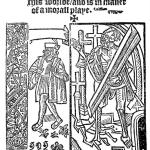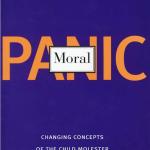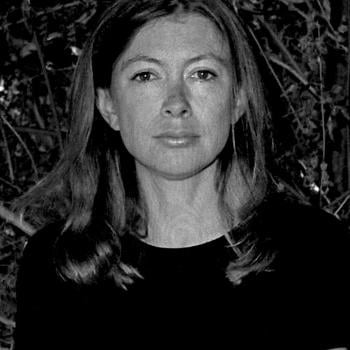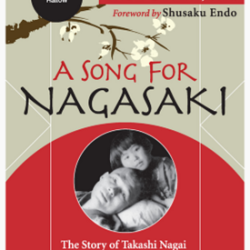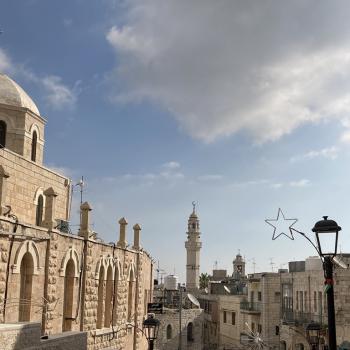Let me review my last couple of posts. First, I discussed the growing attention among historians toward the importance of religion (particularly forms of Christianity) for US Latino/as. Second, I focused on the popularity of C.S. Lewis and how it has grown since the start of the postwar generation, showing no signs of receding.
In this post I would like to reference a passing academic phenomenon that is surprising since, according to my last posts, religion has been and remains important. This is the so-called “return of the religious” found among many recent European intellectuals. Some of the public figures are the following: Jacques Derrida, Jacob Taubes, Alain Badiou, Giorgio Agamben, Gianni Vattimo, Rene Girard, and Slavoj Žižek. This return is due to the assumed secular nature of the European landscape. The literature that fits this genre was first published in the mid-late 1990s. Some of the reactions are to the very public nature of Islam in Western societies around the same time (whoa, they are publicly religious). Other responses feature the combing of the Western tradition, specifically Jewish and Christian sources, to speak to the current state of affairs (again, could also be an attempt to confront these manifestations of Islam). Even though this academic fad seems to have passed, a brand new book by Žižek reveals that this return of the religious has not completely vanished yet.
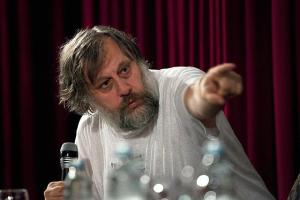 Žižek, as usual, gesticulating
Žižek, as usual, gesticulating
I was obsessed with this literature during my graduate education. I even went to see Žižek speak at UCI and got his autograph in one of his books I read voraciously. Some of my earliest publications are putting Žižek in conversation with Protestant theologian Karl Barth (again, graduate school). I started, however, to have some serious reservations about Žižek’s philosophy and I took to heart the critique many Muslim and Latin American theorists had about his Eurocentrism. For instance, how can religion be returning when it is such a big deal in other parts of the world? How very Eurocentric our reading!
I am still on the fence about whether or not I will read Žižek’s new book. It has amazingly been these last few months teaching World Civilization courses and watching current world history unfold that has actually opened me up to start reading Žižek again. What can we learn from Europe’s so-called secular vantage point? Maybe the openness to think about the “return of religion” (by mostly non-believers) and all that entails is worth revisiting especially for historians trying to understand our present? Following a sort of fidelity to C.S. Lewis, should we not be studying this literary/philosophical phenomenon of non-Christians (for the most part) all of the sudden obsessed with the epistles of the Apostle Paul?
Perhaps there is a point to turn toward Europe in history, without losing sight of the global picture, at this present time. Let me provide one example by focusing on another European intellectual who usually is not included in this movement but I think he is illustrative about some of the historical consequences of religion, politics, and violence in our times.
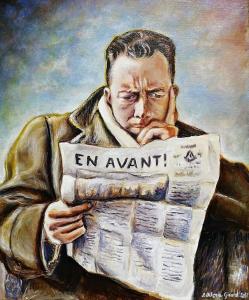 Camus reading the morning paper
Camus reading the morning paper
Consider this famous statement by French Algerian author Albert Camus, who wrote the classics The Stranger and The Plague: “People are now planting bombs in the tramways of Algiers. My mother might be on one of those tramways. If that is justice, then I prefer my mother.” This quote is probably the closest to what Camus historically said. In his recent book The Will to See: Dispatches From a World of Misery and Hope, French public intellectual and globetrotter Bernard-Henri Lévy quotes Camus saying: “Between justice and my mother, I choose my mother” (42). This is often how the quote is presented, but it misses the historical situation of the Algerian War and French colonialism that prompted Camus’s comments. Lévy’s standard quote makes Camus seem relatively selfish, choosing filial fidelity over the concerns of both the neighbor and the stranger. Do you not really care about justice, Camus? Analyzing the quote in its context, however, Camus states if your cause for justice resorts to the same type of violence that you decry, then he does not want any part of it.
Guerilla warfare, revolutionary violence, and domestic terrorism have only grown since the late 1950s-early 1960s when Camus was alive. Camus, in contrast to some of his contemporaries, thought the choice between either the executioners or the victims was a false one. Remarkably it was also a time period when the most recent historical ideal of the nonviolent protest of the civil rights movement was in full swing here in the States. It was the era of King, Day, Merton, and Chavez to name just a few Christian, public U.S. American figures. On the one hand, in the case of MLK and the civil rights movement or Chavez and the farm workers, we are generally fine with their public faith expression (of course there a few detractors). On the other hand, one of the reasons the New Atheists (Hitches, Dawkins, Harris, Dennett) phenomenon ascended at the same time Žižek and company are reading Pauline epistles was because of the rise of religiously based terrorism and the sloppy thinking that justifies violence for the cause.
How have we gotten to this point? And how does this recent literature about the “return of the religious” attempt to frame our historical moment?
Contemporary Christian nonviolent theorists and activists from Leo Tolstoy to the Berrigan brothers have never shied away from exposing the violence that ungirds society. Commitment to nonviolence is not easy especially if you believe in our sin nature. Resistance to remain truly nonviolent takes discipline. However, recognizing this fact, the concrete violence that Camus describes does not give a blank check as a “weapon of the powerless.” The strength of Camus’s overall work is that he gets to the heart of the absurdity of existence and the alienation we often feel toward our reality, yet an unbinding commitment to the beauty of being human was something that Camus could not simply erase.
Last summer reading a lot of King, Day, Merton, and Chavez was helpful to reflect on Christian peacemaking, but sometimes that can be something memorialized in books or amongst the various voices within Christian communities. It is good to look outside sometimes and see what others are saying (or said, in Camus’s case). My fear over our growing, polarizing public language and the increasing disinformation of news, even though we have more access to information than ever, is that we eventually create people who, left with Camus’s choice, would not choose their mother.


